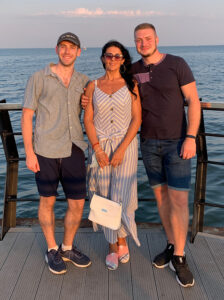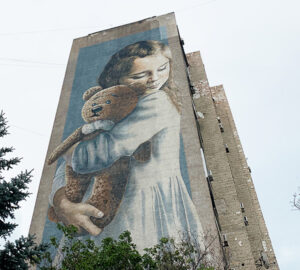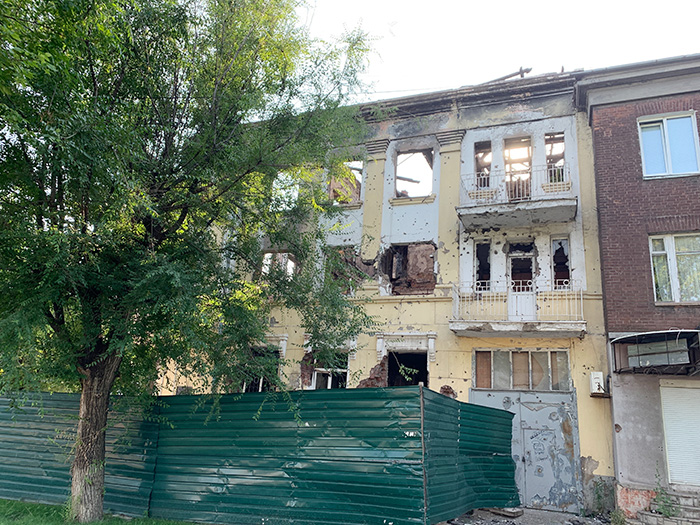By Max Frost, Rocanews.com, Chronicle Foreign Correspondent

Last July, my last stop in eastern Ukraine was Mariupol, a city on the Azov Sea that had been occupied by the separatists for 2 months in 2014.
Getting there took a 7-hour bus ride, parts of which were within 9 miles (15 km) of the ceasefire line. Some of the towns we passed through are at constant risk of being caught in the crossfire. Along the road we passed bunkers and buildings that had been covered in camouflage and commandeered by the army.
We passed through several military checkpoints: Soldiers had erected cement structures on the road, forcing us to pull over. The soldiers would come on the bus, do an inspection, and pick people for document checks.
At one stop, a soldier came on board and yelled, “MEN!” All the men filed off the bus to be searched; the woman next to me, who could tell I was a foreigner, told me not to get off. I had been told they often don’t let foreigners pass through. At another checkpoint, the soldiers singled out the guy across from me and demanded to know why he wasn’t in the military. By luck, they didn’t look at me.
In Mariupol, a Ukrainian soldier named Andrei hosted me and showed me around the city. In 2014, the separatists, whom he called “terrorists,” took the city and held it for 2 months until the Ukrainians took it back. Most of the city has been rebuilt, but many buildings, including the town hall, are still destroyed, either bombed out or riddled with bullet holes. Today, the ceasefire line cuts through the city’s suburbs, parts of which were hit by artillery the night before I arrived.

Andrei was a university student in Mariupol when the war started. I asked how life changed: “It got worse.” “How?” “McDonald’s closed. Seriously, they still haven’t come back.” I had dinner with Andrei and his girlfriend Natalya in his Soviet highrise apartment. During the occupation, the windows to his apartment would rattle to the gunfire outside each night. “Ratatatat,” he said, tapping the window to imitate the sound of gunfire.
Mariupol itself is notable for its filthy air. I couldn’t stop coughing and my contacts couldn’t stay in. Overlooking the city were steel plants, which Andrei told me had been built in the 19th century and still use the same technology today.
Andre was a self-declared patriot; his apartment was decorated with disarmed mines and bullet casings, like a character from the Hurt Locker. His walls were decorated with Ukrainian nationalist memorabilia. Russian is his first language, but he would rather speak Ukrainian. Natalya, an army nurse, was adamantly not a patriot. She was proud of her Russian heritage.
At dinner, I asked if life was better now or during the Soviet Union: They responded at the same time:
Andrei: “Now.” Natalya: “Soviet Union.”
I asked her why: “Socialism. We have to pay for everything. We pay for jobs, healthcare, education. Look at Belarus! Everything there is free.”
Andrei: “Belarus?! They kill people who criticize the government. We’re free.”
Natalya: “Who cares if we’re free if we can’t afford anything!”
Andrei: “The people are trying to overthrow the government in Belarus!”
Natalya: “That’s 1% of the population. Most people love the government.”
For context, Natalya was in her early 40s, Andrei his late 20s, so Natalya had been born in the Soviet Union. Growing up, Natalya had family in Belarus and spent her summers there.
The topic turned to Ukraine’s language laws, which have made Ukrainian the mandatory language in schools.
Natalya: “We speak Russian! What will the Russian kids do? They won’t be able to learn in school!”
Andrei: “Our country is Ukraine! We should speak Ukrainian! Every Soviet country has its own language, except for us!”
Natalya: “But we are Russians!”
Andrei: “Ok, then go to Rostov!” Rostov is the Russian city over the border.
One of the decorations on Andrei’s wall was the symbol of the Azov Battalion, the Ukrainian militia that helped liberate Mariupol from the separatists in 2014. Western media often refers to the group as something like a fascist ISIS, attracting hardcore right-wingers from around the world for combat and political training in Ukraine. In Ukraine itself, many people – including some of the most liberal-minded Ukrainians I met – view them as heroes: They were instrumental in fighting the separatists, and they say the media coverage is western paranoia.

Before my train out of the city, Andrei took me to a square honoring Mariupol’s “liberators.” Overlooking it was a mural of a girl holding a teddy bear on a nearby highrise (see front page photo). Andrei told me its story: In 2015, separatists (“terrorists”) launched rockets at a market on a Saturday afternoon. The girl lost her hand, and her mother was killed. Mariupol erected the mural as a reminder of the costs of war and the horrors the “terrorists” had brought upon the city.
Update: March 20, 2022
The Azov Battalion is now playing a crucial role in defending Mariupol, which is under siege. Russian troops surround it and have blocked most people from exiting, as well as humanitarian supplies from entering.
I was in touch with both Andrei and Natalya in the lead-up to the war.
Natalya was sure there wouldn’t be a war; “throw out your television :)” she told me. Andrei was less calm: “We hope everything will be fine and there won’t be a full-scale war.”
I’ve since been in touch with Natalya. She doesn’t know where Andrei is, and as of Friday, hadn’t heard from him in 2 weeks.
Natalya had sent her 2 children off with her mother and was working in a Mariupol hospital. “There are a lot of injured, dead children :(“ she told me on February 27. “We relax 3 hours a day. I can’t sleep.”
Last Friday, she messaged me: “I’m trying to save children. The explosions are hitting me.”
Then on Saturday, she sent me a photo of her destroyed apartment: “I am on my way to Lviv [in the West of the country]. I don’t know what to do next. I no longer have a home.”
Sign up for rocanews.com. It’s free.

Copyright © 2022 Lone Oak Publishing Co., Inc. All Rights Reserved
 Glens Falls Chronicle Serving the Glens Falls/Lake George region; Warren, Washington and northern Saratoga counties since 1980
Glens Falls Chronicle Serving the Glens Falls/Lake George region; Warren, Washington and northern Saratoga counties since 1980

